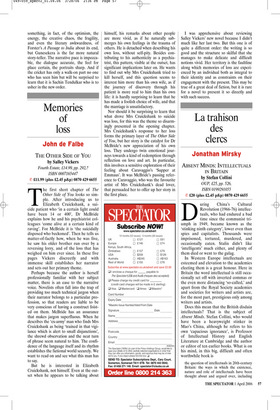Memories of loss
John de Falbe
THE OTHER SIDE OF YOU by Salley Vickers Fourth Estate, £14.99, pp. 292,? ISBN 0007165447 V £11.99 (plus £2.45 p&p) 0870 429 6655 The first short chapter of The Other Side of You looks so simple. After introducing us to Elizabeth Cruickshank, a suicide patient who ‘in a certain light could have been 14 or 400’, Dr McBride explains how he and his psychiatrist colleagues ‘come alive at a certain kind of raving’. For McBride it is ‘the suicidally disposed who beckoned’. Then he tells us matter-of-factly how, when he was five, he saw his older brother run over by a reversing lorry, and of the loss that has weighed on him ever since. In these five pages Vickers discreetly and with immense skill establishes her narrator and sets out her primary theme.
Perhaps because the author is herself professionally familiar with her subject matter, there is an ease to the narrative voice. Novelists often fall into the trap of providing too much technical jargon when their narrator belongs to a particular profession, so that readers are liable to be very conscious of having a construct foisted on them. McBride has an assurance that makes jargon superfluous. When he describes the ‘ex-army’ man who finds Mrs Cruickshank as being ‘trained in that vigilance which is alert to small disjunctions’, the shrewd observation and the neat turn of phrase seem natural to him. The confidence of the language itself and its rhythm establishes the fictional world securely. We want to read on and see what this man has to say.
But he is interested in Elizabeth Cruickshank, not himself. Even at the outset when he appears to be talking about himself, his remarks about other people are more vivid, as if he naturally submerges his own feelings in the trauma of others. He is detached when describing his own loss, without self-pity. Besides contributing to his authenticity as a psychiatrist, this pattern, visible at the outset, has significant implications later on. He wants to find out why Mrs Cruickshank tried to kill herself, and this question seems to interest him more than his own wife, as if the journey of discovery through his patient is more real to him than his own life: it is hardly surprising to learn that he has made a foolish choice of wife, and that the marriage is unsatisfactory.
Nor should it be surprising to learn that what drove Mrs Cruickshank to suicide was loss, for this was the theme so disarmingly presented in the opening chapter. Mrs Cruickshank’s response to her loss forms the primary layer of The Other Side of You, but her story is the catalyst for Dr McBride’s new appreciation of his own loss. They undergo twin emotional journeys towards a kind of redemption through reflection on love and art. In particular, this involves a sensitive exploration of their feeling about Caravaggio’s ‘Supper at Emmaus’. It was McBride’s passing reference to Caravaggio, who was the favourite artist of Mrs Cruickshank’s dead lover, that persuaded her to offer up her story in the first place. I was apprehensive about reviewing Salley Vickers’ new novel because I didn’t much like her last two. But this one is of quite a different order: the writing is so good and the structure so skilful that she manages to make delicate and difficult notions vivid. Her territory is the faultline along which memories of loss are experienced by an individual both as integral to their identity and as constraints on their engagement with the present. This may be true of a great deal of fiction, but it is rare for a novel to present it so directly and with such success.


























































































 Previous page
Previous page